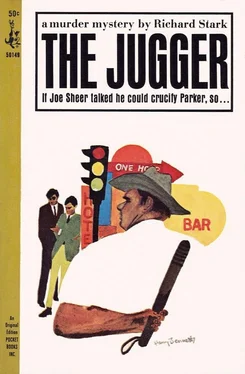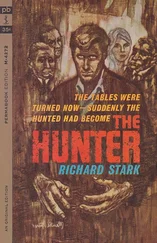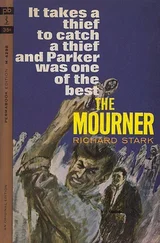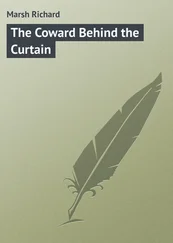“Surely you have no suspicion there was anything untoward in Mr. Shardin’s death?”
But Parker shook his head. “I know he had a bad heart,” he said, lying. “That was why he retired when he did. I don’t think there’s anything funny about the way he died; who’d want to kill him or do him any harm? He was just an old guy, retired, taking it easy.”
“Certainly.” Gliffe nodded, smiling fatuously. “The golden years,” he said. “I myself am looking forward — but that, of course, is in the future. What business did you say Mr. Shardin was in?”
So he’d finally come out with the question head-on. In answer to it, Parker said, “He wasn’t in any business around here, he was retired.”
Before Gliffe could say anything else, explain what he’d meant to say or try to pin Parker down more closely, Parker got to his feet and said, “I better be going. I don’t want to take too much of your time.”
“Not at all, not at all.”
Gliffe stood up behind the desk, his lips pursing just a trifle in discontent. They shook hands again, and Gliffe said, “I’m happy to have had a chance to meet someone who knew Mr. Shardin in life. Not having had the opportunity to know him, I was frankly curious about him, about his past, his friendships, his life in general.”
“Well, that’s all over for him now,” Parker said.
Irritation flickered across Gliffe’s face. “Yes,” he said. “So it is.”
Parker said, “I can find my own way out.”
Tiftus was on the lawn, sitting on the sign that said FUNERAL HOME.
He got to his feet when Parker walked out to the sunlight, and came over towards Parker smiling and tapping his head. “Am I smart?” he wanted to know.
Parker said, “No.”
“I’m in your room there, you’ve got the local paper. I says to myself, what the hell does Parker want with a crummy local paper? What else but the obituary, the undertaker’s address? Now, am I smart?”
Parker stood in front of him and said, “Already today I hit you twice. Once I knocked the wind out of you, once I knocked the consciousness out of you. Here you are back the third time. You call that smart?”
“I told you you could count on me this time, Parker, and I meant it.” The little man was smiling his cocky grin, but underneath it there was steel; something new and different for Tiftus. He said, “If you want us to be partners, that’s okay. If you want us to be competitors, that’s okay, too. It’s up to you.”
Parker said, “Good-bye.” He started down the street.
But Tiftus hadn’t been giving an ultimatum after all. He trailed along, bright as a counterfeit penny, trotting to keep up with Parker’s long stride. “You really put a scare into Rhonda,” he said, as though it were something funny but slightly naughty Parker had done. “You really scared her.”
Rhonda. She must have picked up the name the same place she got the tan.
“We’re both in this,” Tiftus said, panting a little because of having to move so fast. “Don’t think I’ll quit.”
Parker kept walking, ignoring him.
Tiftus trotted and panted, skipping along in Parker’s wake like a Scottish terrier. He said, “Where you going now, Parker? You going out to Joe’s house? You know where it is?”
Parker strode on.
Tiftus said, “You been here before, haven’t you? You and Joe was good buddies, wasn’t you?”
Parker had nothing to say to him.
Tiftus said, “I know it, Parker, I know all about it. You used to come up here and visit him all the time, I heard about that. You think you got the inside track now, don’t you?”
Parker said nothing, but he was listening. Tiftus might say something useful after all.
Tiftus said, “I’m not greedy, Parker, you know me, you know I’m not the greedy type. We could work something out. You hear me?”
Parker didn’t slacken his pace, but he said, to see if Tiftus would tell him anything, “Work what out?”
“The split,” Tiftus said, as though that explained anything. As though it explained everything. “The split.” He said it twice. “I don’t ask fifty-fifty,” he said, and his voice showed he knew how generous he was being. “I know Joe was your friend, you got more of a claim than me, I know that. But I’m here, too, Parker, you got to accept that. I got a claim, too, because I’m here. You got to work out a split with me.”
“How much?”
“Make me an offer.”
Damn Tiftus! He kept talking all the time, talking as though he knew exactly what he was talking about, but he never said anything. Jabber jabber jabber, and nothing coming out.
Some things were obvious: Tiftus was here because he thought there was money to be made here somewhere, and his hope for money was connected with Joe Sheer somehow, and he figured Parker was here for the same reason. But did Tiftus’ hopes and expectations have anything to do with Joe’s troubles? Or with the way Joe died? Or with why Captain Younger was hanging around?
There were too many questions, too few answers, and not enough time.
It was too bad Tiftus was such a loser, so unreliable, such a mistake. If it had been somebody with brains and dependability, somebody like Handy McKay or Salsa, Parker would have worked an arrangement with him by now and they’d all know where they stood. But not Tiftus; Parker wouldn’t link up with Tiftus ever.
Take the business of the woman. Tiftus is supposed to be coming here to work, and he brings a woman along. Parker had a woman, too, and he’d left her in Miami when he’d come up here. But Tiftus brought his along; a man who won’t give up comfort for success makes a bad partner.
Tiftus said again, “Make me an offer, Parker.”
The only thing to do was get away from Tiftus, ignore him, find out what there was to know from other sources. Parker stopped, turned, and grabbed a handful of orange shirt. “Here’s the offer,” he said. “Third time today.”
“Don’t!”
Parker clipped him, enough to feel but not enough to knock him out. When he let the little man go, Tiftus sat down on the sidewalk like a baby.
Parker stood over him, hands closed into fists. “The next time you show up,” he said, “I’ll fix you so you don’t show up anymore. You know me, Tiftus, you know I don’t say things for fun.”
Tiftus didn’t say anything. He just sat there.
Parker looked around. They were on a residential street, houses with porches. A few cars went by, and the people in them looked curiously at Parker and Tiftus but didn’t stop. There were no pedestrians in this block.
Parker said, “Good-bye, Tiftus.”
He turned around and walked away. Behind him, Tiftus just sat on the sidewalk. The people in the cars going by looked at the brightly dressed little man sitting on the sidewalk. After a few minutes he got to his feet and went away. He didn’t follow Parker.
It looked like a private home, except for the small metal sign on the lawn:
L. D. RAYBORN, MD
Parker went up on the broad porch and saw the other sign beside the front door. This one simply said OFFICE and had an arrow pointing away to the right. Parker went that way, his steps echoing on the bare boards of the porch. The porch was freshly painted but empty of furniture, as though the house were vacant. At the side of the house he saw that the porch went around to a little cubby-hole where there was another door.
And another sign, this one above the doorbell: RING AND WALK IN.
He rang, then tried the knob. The door was locked. Exasperated, he rang again, longer this time.
He was just about to go back to try the main door when this one opened, and an angry nurse, glaring at him through the screen door, said, “Office hours are not until two.”
Читать дальше












